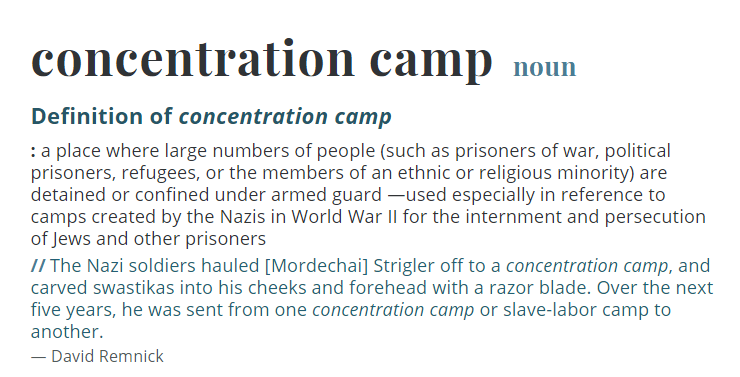Last week, Republicans and the far-right media challenged the notion that it’s accurate to refer to border camps for migrants as concentration camps.
This recent episode in our fractured political discourse followed a video that Rep. Alexandria Ocasio-Cortez (D-New York) posted on Instagram last week. In the video, she called border camps for migrants concentration camps, adding, “The fact that concentration camps are now an institutionalized practice in the ‘Home of the Free’ is extraordinarily disturbing, and we need to do something about it.”
She referred to the Fort Sill Army base in Oklahoma, where the Department of Health and Human Services plans to house up to 1,400 immigrant children in makeshift housing. The base also served as a Japanese-American internment camp during World War II.
Ocasio-Cortez’s comments fueled criticism from Sen. Lindsey Graham (R-South Carolina), Rep. Liz Cheney (R-Wyoming) and far-right sites like Breitbart and Human Events. Without naming Ocasio-Cortez directly after the controversy emerged, House Speaker Nancy Pelosi warned Democrats that Republicans will “misrepresent anything that you say. Just, if you have one word in the sentence that they can exploit.”

Meanwhile, nonpartisan news organizations wrote stories highlighting criticism against Ocasio-Cortez, like this one from The Washington Post, that never explain what concentration camps are.
So, let’s do something radical. Let’s crack open the dictionary and see what it says.

So, Ocasio-Cortez was right. The definition is also in the name. Concentration camps are essentially places where a group of people who share a common characteristic are “concentrated” in one place.
In response to Ocasio-Cortez’s comments, Cheney said on Twitter that “6 million Jews were exterminated in the Holocaust. You demean their memory and disgrace yourself with comments like this.”
Obviously, border detainment centers aren’t places of violence like the death camps of Nazi Germany, although the conditions are such that five immigrant children died in Customs and Border Protection custody since last year.
Cheney and others connect concentration camps to the Holocaust, and reasonably so, because that’s what we generally call those camps today.
However, that phrase can be accurately applied to other situations where individuals are detained. The United States’ Japanese-American internment camps also are concentration camps, based on Merriam-Webster’s definition. And since that definition specifically mentions refugees and ethnic minorities, migrant detention facilities are also technically concentration camps.
Finally, this subject could use a little context on the conditions in some of these detainment centers. They aren’t a window into Nazi Germany, but the centers are beyond capacity and in some cases failing to meet federal requirements for detaining migrants.
For instance, the Associated Press reported on Friday that a legal team identified neglect and mistreatment at a Border Patrol detention facility that houses about 250 youth in Clint, Texas. Lawyers said kids there don’t have access to adequate food, water or sanitation. The children hadn’t bathed or changed clothes for weeks.
CBS News reported this month that the Department of Health and Human Services isn’t providing children in custody with education, legal services and recreation. The agency is required to provide those services, even during a budget crisis.
Federal laws and policies put in place through legal settlements dictate the minimum criteria that federal agencies must meet when it comes to detaining immigrants, asylum-seekers and trafficking victims. For instance, a 1997 settlement in a case called Flores v. Reno requires the United States to release migrant children after 20 days in detainment and to provide them with basic necessities, like food, water and emergency health care.
Note: American Mythology is a series where we factcheck an entire piece or debunk a topic across multiple publications or platforms. You can learn more about our approach to factchecking here.
Contact Mollie Bryant at 405-990-0988 or bryant@bigiftrue.org. Follow her on Facebook and Twitter.
